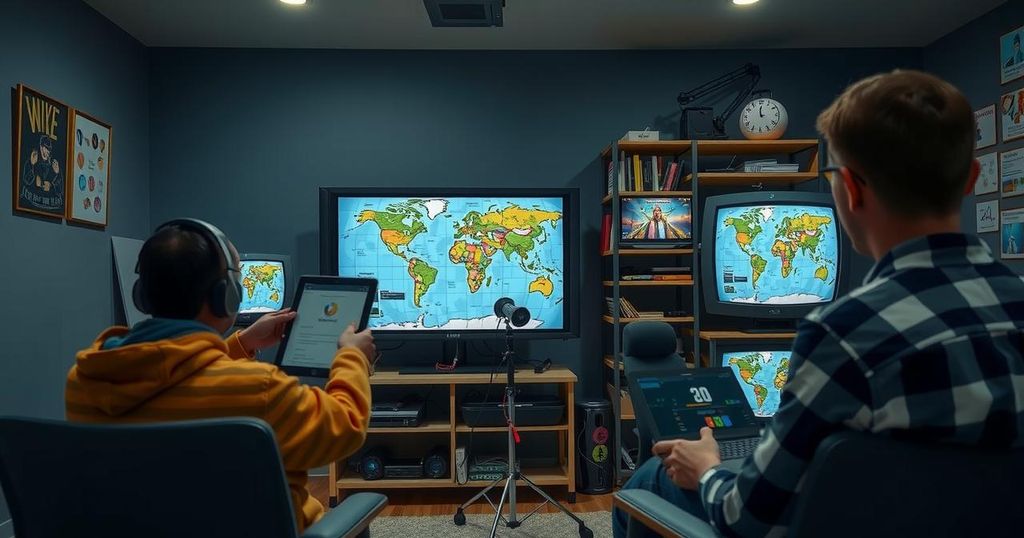TV BRA: A Groundbreaking Voice for the Learning Disabled Community
TV BRA is the world’s first TV station run exclusively by individuals with learning disabilities. Broadcasting weekly, the station presents news and entertainment in a simplified manner to make it accessible. Emphasizing professional presentation and community engagement, its reporters tackle real-world issues while forging new paths in media representation. From innovative interviews to impactful reports, TV BRA champions the rights of people with disabilities in Norway.
Deep inside the vibrant heart of Norway lies TV BRA, a groundbreaking station entirely run by individuals with learning disabilities. Their new studio, adorned in eye-popping pink—a hue loved by reporters like Emily Ann Riedel and Petter Bjørkmo—sets the stage for an innovative approach to news. Each week, this dynamic team crafts an hour-long magazine program that makes news, sports, and entertainment accessible to all, creating a unique space for their voices. TV BRA, which translates to “TV Good,” airs its content on Norwegian streaming platform TV2 Play, reaching an audience of 4,000 to 5,000 people every week. The news is delivered in simple, slower Norwegian, ensuring clarity for viewers who might struggle with traditional broadcasts. This inclusive approach allows the station to engage with a diverse audience effectively, highlighting their dedication to accessibility. The ten reporters, who work as local correspondents, bring their unique perspectives to the forefront. Riedel, who has Down’s Syndrome, emphasizes the importance of professionalism on air, balancing her vibrant personality with a commitment to scripting. She confidently declaring, “I have inner beauty and outside beauty,” showcases the pride they take in both appearance and presentation. Behind the scenes, managing editor Camilla Kvalheim and a technical crew help produce and edit reports. While some team members face challenges due to learning disabilities, they continually work to improve their skills. Riedel notes that the autocue can be difficult but insists on trying until the shot is perfect. Kvalheim, the visionary behind TV BRA, began her journey more than a decade ago at a care home. The transformative experience of working collaboratively with her students sparked her ambition to create a platform where their voices could thrive. Despite limited funding, the team’s passion drives their mission forward, demonstrating that their impact goes beyond monetary gain. TV BRA empowers its audience by tackling vital issues, such as employment and accessibility for people with disabilities. Their reporters use their platform to highlight important societal conversations, exemplified by Bjørkmo’s impactful report addressing the struggles of individuals in sheltered accommodation. He aims to raise awareness about these challenges facing their community. Recently, Hofsø, a well-known reporter, skillfully questioned political figures about their policies affecting those with disabilities, promoting accountability. Laughter filled the room when he recalled a comical interview with a politician who now jokingly refers to Hofsø’s antics. These interactions illustrate the importance of humor amidst serious topics. During a recent visit from a local lawmaker, the reporters did not shy away from tough questions, showcasing the respect they have earned. Kvalheim’s guidance helped steer their inquiries, reflecting the growing recognition of TV BRA among politicians. A slow transformation in how deaf and disabled voices are represented is beginning to take shape in the media landscape. TV BRA isn’t alone; similar initiatives are emerging across Europe, offering simplified news services for those with learning disabilities. As their viewership continues to embrace the station, audience members affirm that TV BRA’s accessible style resonates deeply with them. The innovative approach fosters inclusivity, enriching the entire community. In a world that often overlooks the needs of people with disabilities, TV BRA stands tall as a beacon of hope. Riedel articulately expresses the mission to uplift and empower her audience, showing them that they are indeed seen and heard. Her vision of acceptance inspires not only her team but countless community members.
The article discusses TV BRA, the first television station in the world operated by and for people with learning disabilities. Located in Norway, it aims to provide accessible news coverage that addresses the needs and rights of individuals with disabilities. The station showcases the talents of its reporters while emphasizing professionalism and community engagement, all framed within a vibrant and supportive environment.
TV BRA is a trailblazer in inclusive media, showcasing the potential of individuals with learning disabilities to engage with current affairs and hold powerful figures accountable. By fostering an accessible, professional platform, the station empowers its reporters to tell compelling stories while connecting with their audience. The initiative not only elevates the representation of disabled voices in the media but encourages societal awareness and change, making it a vital resource for the community.
Original Source: www.bbc.com




Post Comment